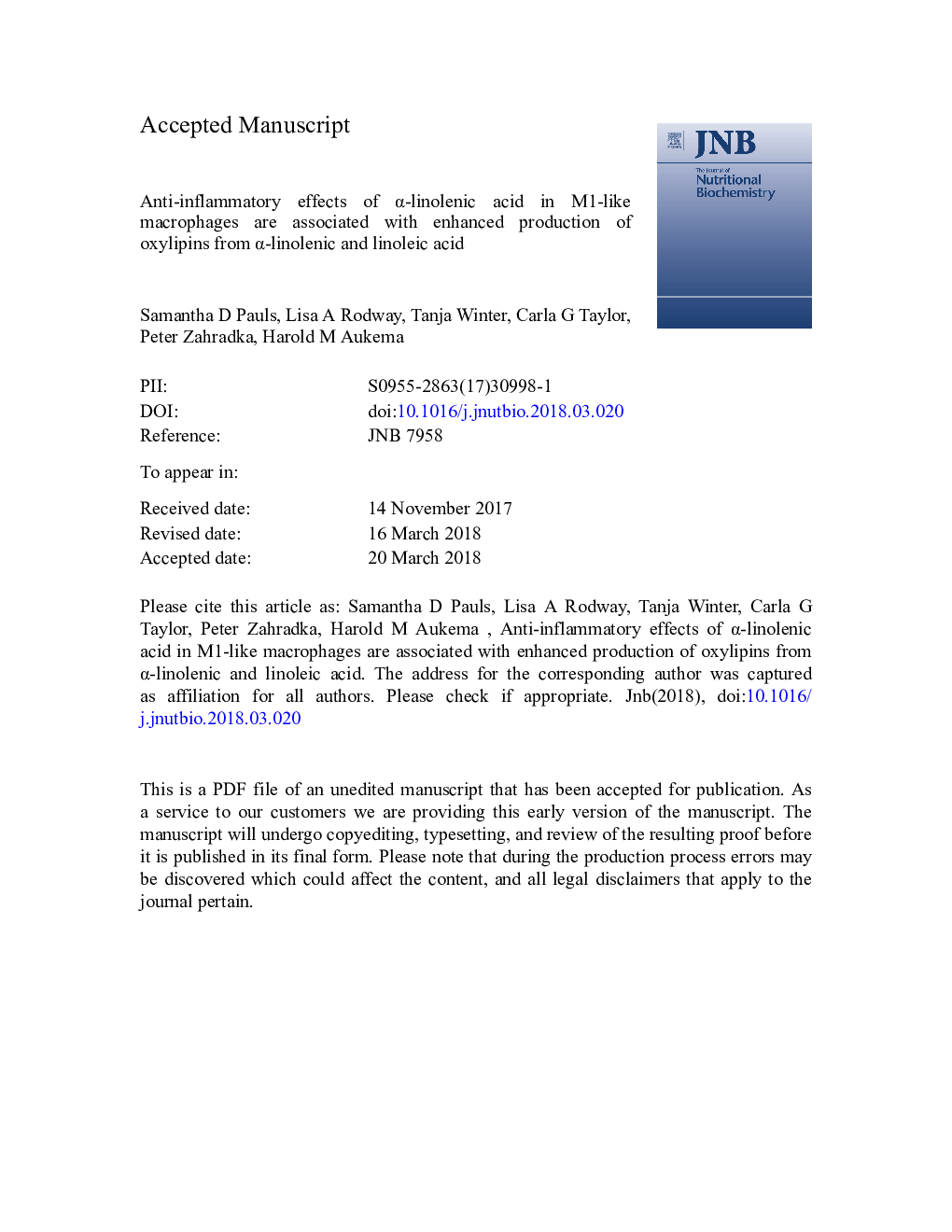| کد مقاله | کد نشریه | سال انتشار | مقاله انگلیسی | نسخه تمام متن |
|---|---|---|---|---|
| 8336327 | 1540611 | 2018 | 33 صفحه PDF | دانلود رایگان |
عنوان انگلیسی مقاله ISI
Anti-inflammatory effects of α-linolenic acid in M1-like macrophages are associated with enhanced production of oxylipins from α-linolenic and linoleic acid
دانلود مقاله + سفارش ترجمه
دانلود مقاله ISI انگلیسی
رایگان برای ایرانیان
کلمات کلیدی
cytochrome P450 epoxygenasePPARGLAdihydroxy-docosapentaenoic acidDiHDPEPLA2IFNγDHKinterkeukinDGLAHHTrEEpDPEHDoHEEPADiHETrEHETrEHEPETNFoxo-eicosatetraenoic acidDiHDoHEdihydroxy-docosahexaenoic acidOxylipinEpODECOXLPSEpETEdihydroxy-eicosatrienoic acidDPAn-3trihydroxy-octadecenoic acidTriHOMEoxo-octadecatrienoic acidHOTrEhydroxy-docosahexaenoic acidepoxy-octadecenoic acidALAMCP-1HODE - HEADcyclooxygenase - آنزیم سیکلواکسیژنازphospholipase A2 - آنزیم فسفولیپاز A2 α-linolenic acid - اسید α-لینولنیکArachidonic acid - اسید آراشیدونیکOleic acid - اسید اولئیکepoxy-eicosatrienoic acid - اسید اپوکسی ایکوزیتروئینیکOxo-octadecadienoic acid - اسید اگزو اکتادکادیاوئیکEicosapentaenoic acid - اسید ایکوزاپنتانوئیکdihydroxy-octadecenoic acid - اسید دی هیدروکسی اکتادیکنیکLinoleic acid - اسید لینولئیکHydroxy-octadecadienoic acid - اسید هیدروکسی اکتادکادیاوئیکhydroxy-eicosatetraenoic acid - اسید هیدروکسی ایکوزاتترنوئیکhydroxy-eicosapentaenoic acid - اسید هیدروکسی ایکوزاپنتانوئیکFatty acid - اسید چربPolyunsaturated fatty acid - اسید چرب غیر اشباعPUFA - اسید چرب چند غیراشباعgamma-linolenic acid - اسید گاما لینولینیکinflammation - التهاب( توروم) Omega-3 - امگا 3EpETrE - اپراتورEpOME - اپومOxoode - اکسوودLOX - اکسیژن مایعthromboxane - ترومبوکسیانdihomo-gamma-linolenic acid - دی هومو گاما لینولنیک اسیدDiHOME - دیهومtumor necrosis factor - فاکتور نکروز تومورlipoxygenase - لیپواکسیژنازlipopolysaccharide - لیپوپلی ساکاریدMacrophage - ماکروفاژ HETE - هفتهmonocyte chemoattractant protein-1 - پروتئین شیمیایی monocyte chemoattractant-1prostaglandin - پروستاگلاندینهاKeto - کتوInterferon gamma - گاما اینترفرون
موضوعات مرتبط
علوم زیستی و بیوفناوری
بیوشیمی، ژنتیک و زیست شناسی مولکولی
زیست شیمی
پیش نمایش صفحه اول مقاله

چکیده انگلیسی
Chronic inflammation, mediated in large part by proinflammatory macrophage populations, contributes directly to the induction and perpetuation of metabolic diseases, including obesity, insulin resistance and type 2 diabetes. Polyunsaturated fatty acids (PUFAs) can have profound effects on inflammation through the formation of bioactive oxygenated metabolites called oxylipins. The objective of this study was to determine if exposure to the dietary omega-3 PUFA α-linolenic acid (ALA) can dampen the inflammatory properties of classically activated (M1-like) macrophages derived from the human THP-1 cell line and to examine the accompanying alterations in oxylipin secretion. We find that ALA treatment leads to a reduction in lipopolysaccharide (LPS)-induced interleukin (IL)-1β, IL-6 and tumor necrosis factor-α production. Although ALA is known to be converted to longer-chain PUFAs eicosapentaenoic acid (EPA) and docosahexaenoic acid (DHA), DHA oxylipins were reduced overall by ALA treatment, as was LPS-induced secretion of EPA oxylipins. In contrast, we observed profound increases in oxylipins directly derived from ALA. Lipoxygenase products of linoleic acid were also dramatically increased, and LPS-induced production of AA oxylipins, particularly prostaglandin D2, was reduced. These results suggest that ALA may act to dampen the inflammatory phenotype of M1-like macrophages by a unique set of mechanisms distinct from those used by the long-chain omega-3 fatty acids EPA and DHA. Thus, there is strong rationale for investigating the functions of ALA oxylipins and lesser-known LA oxylipins since they hold promise as anti-inflammatory agents.
ناشر
Database: Elsevier - ScienceDirect (ساینس دایرکت)
Journal: The Journal of Nutritional Biochemistry - Volume 57, July 2018, Pages 121-129
Journal: The Journal of Nutritional Biochemistry - Volume 57, July 2018, Pages 121-129
نویسندگان
Samantha D Pauls, Lisa A Rodway, Tanja Winter, Carla G Taylor, Peter Zahradka, Harold M Aukema,